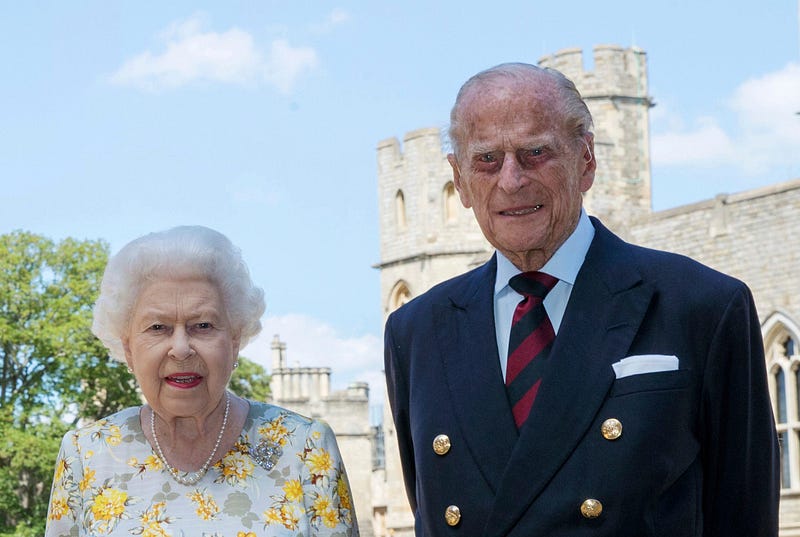
Queen Elizabeth II and her late husband Prince Philip. Photo courtesy of USA Today.
On Friday, April 9 His Royal Highness Prince Philip, Duke of Edinburgh,
passed away in his home at Windsor Castle at the age of 99
. Originally, Prince Philip of Greece and Denmark, he renounced his previous titles and became a
British citizen in 1947
so that he could marry his third cousin, the future Queen Elizabeth II. Upon becoming a British citizen, he took the surname of his uncle Louis Mountbatten, the former Viceroy of India. Prince Philip served in the Royal Navy during the Second World War but later left the navy to focus on royal duties in 1951 when King George VI fell ill. He spent the rest of his life as a consort to the Queen, performing ceremonial duties and
devoting his time to philanthropy
. Much more can be found about Prince Philip’s life and impact
in his
New York Times
obituary
.
With the death of Prince Philip and accusations of racism during
Oprah Winfrey’s interview of Prince Harry and Meghan Markle
,
questions
about the need for and costs of a monarchy have been brought to the spotlight. The monarchy remains a popular institution in the U.K., with
63 percent of those surveyed by a YouGov poll
expressing approval of its existence. Despite this support, the British monarchy has also always had its critics. In his infamous 1776 pamphlet
Common Sense
, Thomas Paine outlines his view, “there is something exceedingly ridiculous in the composition of monarchy; it first excludes a man from the means of information, yet empowers him to act in cases where the highest judgment is required.”
Paine’s analysis holds true even in the 21st century. Even with the limited ceremonial power the Crown possesses, they still prove to be out of touch with the rest of the population. Prince Harry and Meghan Markle’s accusations of racism against the family are only the most recent examples of how the monarchy is out of step with the British population. Other instances include the Queen calling for the British people to embrace self-sacrifice while posing next to a lavish gold piano during her
2018 Christmas address
, and the late Prince Philip’s history of racist comments, including one instance when he asked
an Australian Aboriginal leader if they ‘still threw spears’ at each other.
It is no surprise that the monarchy is out of touch: members of the royal family are trained from their youth to perform their royal duties while also attending the
most prestigious schools available
. Fans of the hit Netflix show
The Crown
may recall the scene where Elizabeth complains to her mother about how she never learned anything of importance when she struggles to think of conversation topics to have with President Eisenhower, who was scheduled to visit Buckingham Palace. The role of the monarchy, according to its
official website
, is to “act as a focus for national identity, unity and pride; give a sense of stability and continuity; officially recognize success and excellence, and support the ideal of voluntary service.” This portrays the Queen and her family as the epitome of British culture and tradition. Thus, the royal family must be an unchanging and stable ideal and should not be expected to be in touch with the so-called common man. In fact, the complete humanization of the monarchy would be its downfall, as it could no longer be successfully romanticized.
Yet, the royal family has already been humanized in recent years, especially through the very public
marriage problems between Prince Charles and Diana Spencer
, and still remains intact. Although the royal family is culturally important and popular, its influence is no longer viewed as essential to any concept of British national character. In contrast to the absolute monarchy present in pre-revolutionary France, Britain has prided itself on constitutionalism, harking back to the signing of the Magna Carta in 1215.
According to the British government’s
Young Citizens website
, the four fundamental British values are democracy, individual liberty, rule of law and tolerance. These values demonstrate a desire for Britain to connect with its democratic and constitutional roots rather than the cultural idealism held through adherence to the monarchy.
Therefore, the monarchy survives in the U.K. because it has no real purpose besides petty ceremonies and an intriguing lavish lifestyle. Similar to the U.S., Britain chooses to take pride in its promotion of democracy and individual rights, rather than the imperialism and monarchy that have been a stalwart of its history. As long as the monarchy keeps this mostly ceremonial role, the British people will see it as emblematic of their history and a tourist attraction, thus maintaining its status.